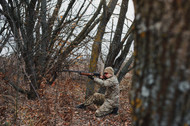How to Get Started in Hunting: Tips for First-Time Hunters
Posted by Tyler Madsen on Apr 17th 2025
Thinking about getting into hunting but not sure where to begin? Whether you're drawn to the outdoors, the challenge, or the self-reliance of harvesting your own food, hunting is a rewarding pursuit—but getting started can feel overwhelming. This guide will walk you through the key steps every first-time hunter should know, from understanding licensing to planning your first outing.
Understand Hunting Laws and Licensing
One of the first steps to becoming a hunter is ensuring you're legally permitted to do so. Each state has its own regulations, licensing requirements, and hunting seasons. Start by visiting your state’s fish and wildlife website to learn:
- What species are legal to hunt and when
- How to obtain a hunting license or permit
- Hunter education course requirements
- Bag limits and reporting obligations
Completing a certified hunter safety course is often mandatory and will teach you critical information about firearms safety, wildlife conservation, and ethical hunting practices.
Choose Your Game
New hunters should start by selecting one type of game animal to pursue. Popular beginner choices include:
- White-tailed deer: Plentiful in many regions with well-established seasons
- Wild turkey: Offers a mix of challenge and accessibility
- Small game (rabbits, squirrels): Great for building tracking and shooting skills
Each species requires different strategies, equipment, and preparation, so narrowing your focus early helps you plan more effectively.
Know Your Terrain
Scouting is essential to a successful hunt. Study maps, satellite imagery, and local regulations to identify public hunting lands or gain permission to hunt on private land. When scouting:
- Look for signs of animal activity such as tracks, droppings, bedding areas, and feeding spots
- Note entry and exit points for your approach
- Visit at different times of day to understand animal movement
Apps like OnX Hunt or HuntStand can help you plan routes and mark high-traffic areas.
Start with the Right Equipment
You don’t need to spend a fortune to get started. At a minimum, make sure you have:
- A legal and appropriate firearm or bow for your chosen game
- Basic camouflage or weather-appropriate clothing
- Hunting boots for rugged terrain
- A reliable backpack with water, snacks, and first-aid
- Safety gear, such as a blaze orange vest or hat
As you gain experience, you can gradually upgrade or specialize your gear.
Practice Makes Proficient
Before you head into the field, practice your marksmanship regularly. Visit a local range to get familiar with your firearm or bow, and learn how it performs under different conditions. Also practice:
- Loading and unloading safely
- Aiming with and without support
- Judging distance
- Shooting from realistic positions
Confidence and competence in handling your weapon are crucial for a safe and ethical hunt.
Learn Field Etiquette and Safety
Hunting is as much about respect as it is about skill. Responsible hunters follow a code of ethics that includes:
- Identifying your target and what’s beyond it
- Respecting landowner property and boundaries
- Leaving no trace in the wilderness
- Prioritizing a clean and humane shot
- Tagging and reporting your harvest according to law
Joining a local hunting club or going out with a mentor is a great way to learn etiquette and safety firsthand.
Be Patient and Enjoy the Experience
Success in hunting doesn’t always come quickly. Some days you won’t see a single animal—but that’s part of the adventure. The more time you spend in the field, the more you’ll learn about animal behavior, weather patterns, and your own abilities. Take time to enjoy the process, the scenery, and the self-reliance that hunting teaches.
Getting started in hunting is a journey—and one that rewards preparation, patience, and a commitment to learning. Whether you’re in it for food, tradition, or a connection to nature, hunting offers a uniquely satisfying experience that lasts a lifetime.



